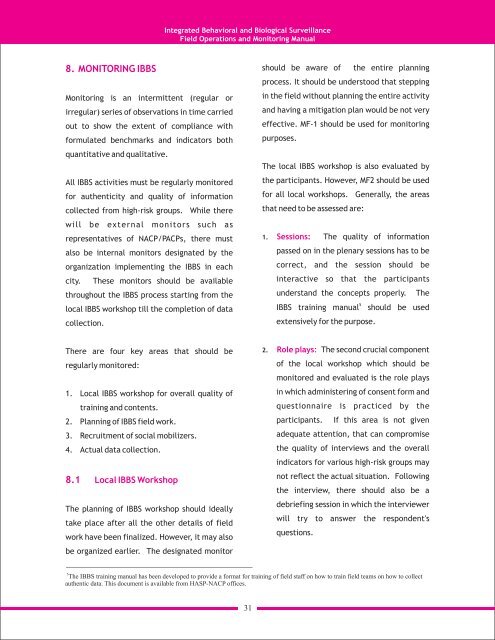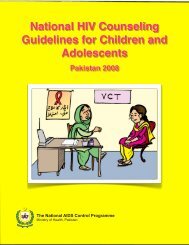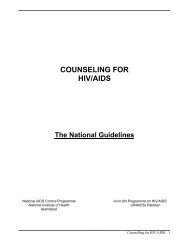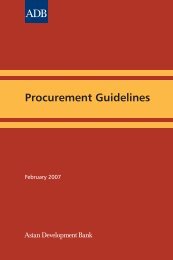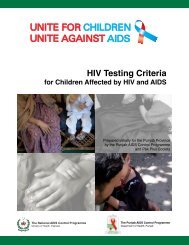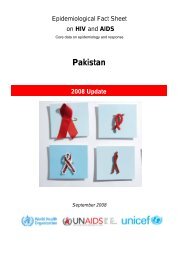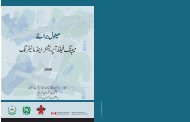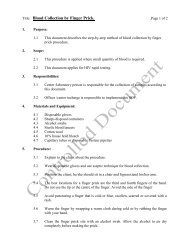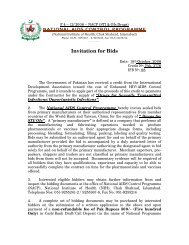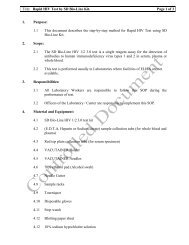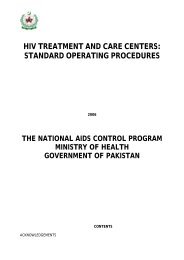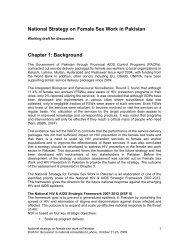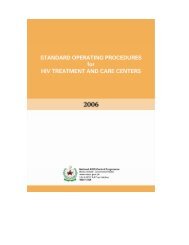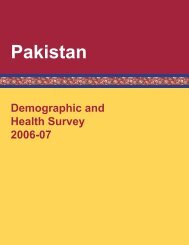IBBS Field operations and monitoring manual English
IBBS Field operations and monitoring manual English
IBBS Field operations and monitoring manual English
Create successful ePaper yourself
Turn your PDF publications into a flip-book with our unique Google optimized e-Paper software.
Integrated Behavioral <strong>and</strong> Biological Surveillance<strong>Field</strong> Operations <strong>and</strong> Monitoring Manual8. MONITORING <strong>IBBS</strong>Monitoring is an intermittent (regular orirregular) series of observations in time carriedout to show the extent of compliance withformulated benchmarks <strong>and</strong> indicators bothquantitative <strong>and</strong> qualitative.All <strong>IBBS</strong> activities must be regularly monitoredfor authenticity <strong>and</strong> quality of informationcollected from high-risk groups. While therewill be external monitors such asrepresentatives of NACP/PACPs, there mustalso be internal monitors designated by theorganization implementing the <strong>IBBS</strong> in eachcity. These monitors should be availablethroughout the <strong>IBBS</strong> process starting from thelocal <strong>IBBS</strong> workshop till the completion of datacollection.should be aware ofSessions:the entire planningprocess. It should be understood that steppingin the field without planning the entire activity<strong>and</strong> having a mitigation plan would be not veryeffective. MF-1 should be used for <strong>monitoring</strong>purposes.The local <strong>IBBS</strong> workshop is also evaluated bythe participants. However, MF2 should be usedfor all local workshops. Generally, the areasthat need to be assessed are:1.The quality of informationpassed on in the plenary sessions has to becorrect, <strong>and</strong> the session should beinteractive so that the participantsunderst<strong>and</strong> the concepts properly.The5<strong>IBBS</strong> training <strong>manual</strong> should be usedextensively for the purpose.There are four key areas that should beregularly monitored:1. Local <strong>IBBS</strong> workshop for overall quality oftraining <strong>and</strong> contents.2. Planning of <strong>IBBS</strong> field work.3. Recruitment of social mobilizers.4. Actual data collection.8.1 Local <strong>IBBS</strong> WorkshopThe planning of <strong>IBBS</strong> workshop should ideallytake place after all the other details of fieldwork have been finalized. However, it may alsobe organized earlier. The designated monitor2.Role plays: The second crucial componentof the local workshop which should bemonitored <strong>and</strong> evaluated is the role playsin which administering of consent form <strong>and</strong>questionnaire is practiced by theparticipants. If this area is not givenadequate attention, that can compromisethe quality of interviews <strong>and</strong> the overallindicators for various high-risk groups maynot reflect the actual situation. Followingthe interview, there should also be adebriefing session in which the interviewerwill try to answer the respondent'squestions.5The <strong>IBBS</strong> training <strong>manual</strong> has been developed to provide a format for training of field staff on how to train field teams on how to collectauthentic data. This document is available from HASP-NACP offices.31


